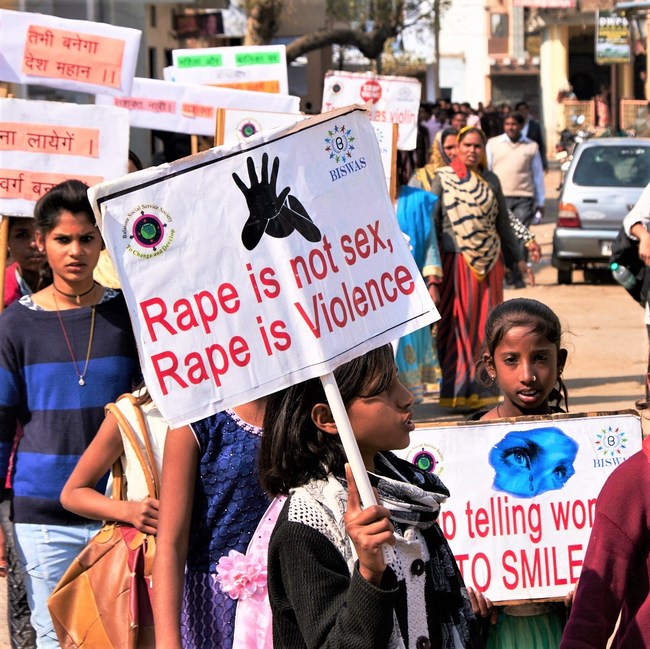NEW DELHI, April 21, 2021 /PRNewswire/ — A new report reveals how laws on rape in South Asian countries are insufficient, inconsistent, and not systematically enforced, putting women and girls at heightened risk of sexual violence. Survivors and victims’ families frequently face further victimization, resulting in extremely low reporting rates for rape, long delays within the criminal justice system, and withdrawal of cases.
Released jointly by international women’s rights organization Equality Now and Dignity Alliance International, Sexual Violence in South Asia: Legal and Other Barriers to Justice for Survivors focuses on six countries – Bangladesh, Bhutan, Nepal, Maldives, India and Sri Lanka – and calls on their governments to take urgent action to address sexual violence, improve access to justice for survivors, and end impunity for perpetrators.
Analysis of country-specific laws and policies relating to sexual violence found gaps in laws, failures in implementation, and governments not fulfilling their commitments and obligations in international law regarding the protection and promotion of women and girls’ human rights.
Survivors, activists, and lawyers reported numerous obstacles experienced by rape victims. For the small minority who do manage to file police complaints, it is only the start of a long, arduous quest to access justice. Impediments include:
- Conviction rates for rape are extremely low throughout South Asia – in Bangladesh, it is only around 3%;
- Long delays in police investigations, medical examinations, prosecutions and trials;
- Police officers refusing to file complaints or failing to investigate allegations; in Bangladesh, India, Nepal and Sri Lanka – stakeholders spoke about justice system officials being susceptible to bribery and corruption;
- Overly burdensome or discriminatory evidence required in rape cases; for example, Bangladesh, Bhutan, Nepal, Maldives and Sri Lanka all permit evidence about the sexual history of rape victims;
- In India, Nepal and Sri Lanka, the “two-finger test” – an unscientific, intrusive and retraumatizing vaginal examination performed on the wrongful premise that it can determine a victim’s sexual experience and which is often used to imply she is lying – is conducted in medical examinations of women and girls who’ve been raped;
- Rape survivors and their families frequently face extreme pressure to withdraw criminal complaints and stay silent; this includes being forced into informal community mediation, and subjected to social stigma, victim blaming, threats, bribery, and retaliation including loss of employment, eviction, and further violence;
- Survivors are coerced into dropping legal cases and accepting extra-legal settlements or compromises with perpetrators;
- Marital rape is not criminalized in Bangladesh, Maldives, India and Sri Lanka;
- Support services for survivors are lacking, with minimal access to safe houses, counselling or other types of psychosocial care; poor provision of victim and witness protection schemes puts survivors and their families at risk of coercion and further harm;
- Survivors from socially excluded communities face even greater barriers to accessing justice as a consequence of ethnic, religious, caste, and tribal prejudice and persecution.
Report co-author Divya Srinivasan, a human rights lawyer and Legal Advisor for Equality Now, says: “Our research reveals how governments across South Asia need to take urgent action to provide women and girls with better protection against sexual violence and end widespread impunity for perpetrators. This requires closing gaps in laws, addressing flaws in criminal justice systems, and investing in holistic responses to ensure access to justice and support for survivors.”
The report calls on South Asian countries to implement comprehensive and inclusive measures that effectively address sexual and gender-based violence. This includes:
- Addressing protection gaps in the law
- Improving police responses to cases of sexual violence
- Ensuring survivor-friendly medical examinations
- Improving prosecution procedures and trials of sexual offences
- Designing and funding holistic interventions to improve access to justice for survivors
- Reviewing laws and policies to ensure the specific needs of all marginalised communities are met
Evlyn Samuel, report co-author from Dignity Alliance International, says: “The report reveals a multitude of barriers that survivors of sexual violence experience at different levels while accessing the criminal justice system across these countries. This calls for a dire need on the part of governments to adopt a more comprehensive, gender-sensitive approach in addressing issues of sexual violence against women and girls to bring systemic and transformative changes.”
Contact:
Tara Carey
+44 (0)7971556340
308013@email4pr.com
SOURCE Equality Now


